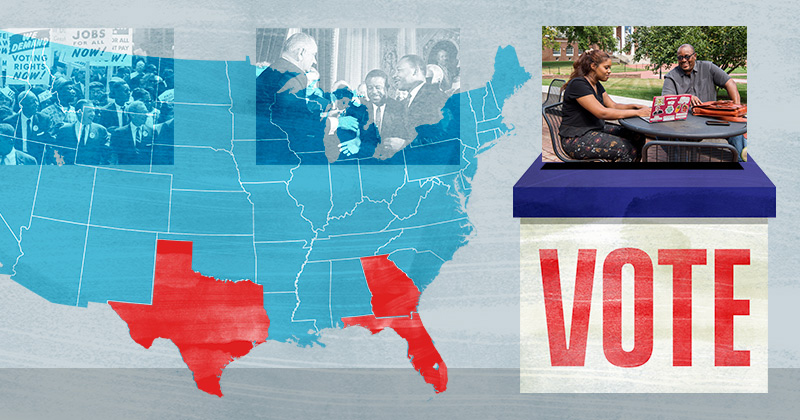

Video about voter suppression research by undergraduate Angelina Craig: youtube.com/watch?v=NhV5rb8uZos
Tracking patterns of suppression
Photos by Kathy F. Atkinson | Illustration and video by Jeffrey C. Chase January 14, 2022
UD undergrad’s research looks at past and present efforts to diminish Black vote
Editor’s note: This Q&A is one of a series of articles exploring the research University of Delaware students have been pursuing. Though COVID-19 continues to shape some plans, students still can participate in hundreds of remarkable projects, in-person and remotely. Follow our “Frontiers of Discovery” series as UDaily highlights some of these scholars.
Changes in voting laws can make significant differences in who can vote, when and where. University of Delaware senior Angelina Craig, a political science major from Deer Park, New York, and a McNair Scholar in the Ronald E. McNair Scholars Program, wanted to see how recent changes in state-level legislation compared with historic efforts to suppress the votes of Black citizens of the United States.

Using case studies in Florida, Georgia and Texas since the 2020 election, she found troubling patterns common to several periods in U.S. history when Black votes were targeted.
Q: What are you studying, where, and with whom?
Craig: With my mentor, Theodore Davis Jr., professor of political science, international relations, and Africana studies, I am researching contemporary voter suppression. More specifically, I am researching the suppression of the Black vote and how the surge in restrictive voting laws after the 2020 election are efforts to diminish Black electoral participation and weaken Blacks as a political unit. My central argument is that recent attempts to change voting laws are part of Black voter suppression efforts that have occurred over three time periods: between the 1920s to 1950s, the 1960s to 2000, and 2000 to the present day. I used case studies of Florida, Georgia, and Texas, as evidence of election reform restricting voter participation to weaken the Black vote.
Q: What draws you to research?
Craig: Conducting research is a challenging process. However, I have always been able to fully immerse myself in the topic I choose. I admire how research can increase public awareness and facilitate learning on a broader scale.
Q: What motivated you to study this topic?
Craig: I was motivated to study this topic because of my passion for advocacy and the belief that every vote counts. Witnessing the negative modifications to civil rights and voting laws, I see that legal boundaries such as restrictive voting laws can oppress and cause a burden for individuals who look like me. With the adoption of new voting laws, I believe it is important to vocalize the history of Black voting rights and voter suppression to convey the negative implications that these laws can have on minority citizens and future elections.

Q: What have you found most surprising about this work so far?
Craig: I was surprised about the statistics I found to support my research. Many of them revealed how voter suppression tactics in urban areas affected past elections.
Q: What are the possible real-world applications for your study?
Craig: The findings of this project confirm that current voting reform efforts in some southern states are identical to past methods of voter suppression. Even though laws proposed by state legislators may have the intent to address election integrity, they make it harder for Black and minority Americans to vote. Therefore, voting provisions across the board — as designed — would have negative consequences on the Black vote. This political issue is currently being debated in Congress amongst Democrats and Republicans. My research sheds light on the concern for Black voters and hopefully allows for the advocacy of expansive voting laws.
Q: How would you explain your work to a non-scientist or a fifth grader?
Craig: I would first start with the history of Blacks’ struggle for political inclusion in the South through party politics and Jim Crow Laws like poll taxes and literacy tests, which intimidated and prevented Black Americans from voting. I would explain how a democracy must make voting accessible for all. Therefore, if restrictive voting laws will affect or burden Black and minority voters from participating in the voting process, those laws are identical to a time in history where discrimination existed and not all people were considered equal.
Q: How does this experience align with your broader professional goals?
Craig: I am currently applying to law school for next year. I hope to practice civil rights law and concentrate on voting rights.
Q: What do you enjoy when you are not doing research?
Craig: When I am not researching, I am preparing for the law school application process. I spend much of the day at a local coffee shop with my friends. To de-stress, I enjoy watching 2000s comedy shows, calling my family and walking around The Green with a cup of iced coffee.
Q: Do you plan to continue your research through the academic year?
Craig: I hope to extend my research throughout the academic year. As new voting laws become enacted and federal decisions are made, I would like to include case studies of other states to support my argument that we are in the third phase of voter suppression.
Q: What advice would you give to your fellow students who may be considering or are planning to pursue undergraduate research?
Craig: I would encourage all students to pursue research. Research allows you to work with a mentor and learn valuable skills that you will not receive from a typical internship. It has personally allowed me to zone in on what I want to pursue as a lawyer and I truly believe it could do the same for other students. It is never too late to start research. First, pick a topic that interests you, then start writing or finding evidence to support your claim. It may be challenging at times, but you will be extremely proud and amazed at what you can accomplish in a short period of time.
For Future Researchers
Blue Hens with big ideas will find ample opportunity to explore them with the help of the Undergraduate Research Program (URP).
A hallmark of any college experience, research is the process that leads to the creation of knowledge. It begins with a question and ends in a new understanding of the world around us.
Those who participate directly benefit from an enriched learning experience. They enjoy meaningful mentorship and develop critical leadership and communication skills. In addition, undergraduate researchers often earn higher grade point averages (GPA) and have greater success after graduation.
To get started on your own experience by scheduling a consultation with URP staff.
Questions? Contact undergradresearch@udel.edu.
Contact Us
Have a UDaily story idea?
Contact us at ocm@udel.edu
Members of the press
Contact us at 302-831-NEWS or visit the Media Relations website

